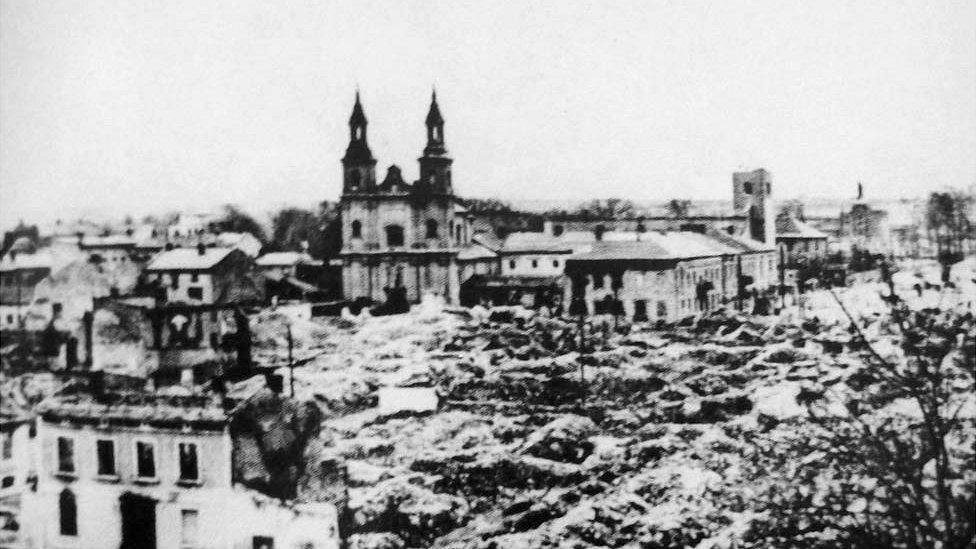Northern Ireland's Polish community remembers horror of WW2
- Published

Dawn on 1 September 1939 and Nazi Germany attacks Poland - in the six years that follow, tens of millions of people die, and Poland and the world is torn apart.
For the Polish, much has changed in the 80 years since.
The rise and fall of communism, EU membership and the emigration of large numbers of the country's young.
Many came to Northern Ireland, with about 3,000 settling in the border city of Newry.
It is home to a host of Polish shops, it has its own Polish church services and there is a consulate in the town hall.
On Sunday, to mark the anniversary of the outbreak of war, a series of events took place in the city.
At the local Arts Centre, backed by the musical accompaniment of Chopin, Norbert Jadczak, once of Poland but now of Kilkeel, told his country's story.
He said one eye was on the past with the other on the uncertainty of the future.
"I believe for our Polish people, even now, 80 years after the war, that we are where we are because of the events of 1 September 1939," he said.
"Every family was really affected by the war. Then 44 years of communism after the war meant our country had great difficulty in developing.
"Because of that, I think, the World War Two needs to be remembered.
"Also, because of where we are in the world at the moment, there are a lot of turning points and questions.
"We all feel that the situation is changing all the time. We are uncertain about the future.
"In these moments it is worth going back to the past to take lessons to make sure we don't make these mistakes again."
The day began with a special bilingual Mass at Newry Cathedral, celebrated by Archbishop Eamon Martin, who in his sermon made pointed comments about the current political discourse.
"Today's anniversary commits us to redoubling our efforts to countering the language of hate, barriers, walls, hard borders and separation," he said.
"To counter that with peace, reconciliation, bridge building and co-operation."
From the cathedral to the cenotaph where, to the sound of a lone piper, Polish Consul General in Northern Ireland Pawel Majewski laid a wreath in memory of those lost during the war.
Their story was then told in art - through the photographs of Anita Hoppe - which use the local landscape to recreate the Polish soldiers' experience.
"I'm over the moon. I couldn't expect anything better. I'm so appreciative that so many people have come here," Ms Hoppe said.
"I've been here for over 13 years and because we live here we wanted to do something to say thank you that we could even live here.
"Our friends live in Newry as well and that's why we wanted to do it here."
A rousing rendition of Dabrowski's Mazurka - the national anthem of Poland could also be heard. It is also known as Poland Is Not Yet Lost.
For the hundreds of Polish families living in Northern Ireland, that sense of home clearly remains potent.
- Published1 September 2019
- Published31 August 2019
- Published1 September 2019